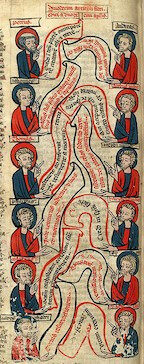Why Creeds? Thoughts on the Nicene Creed
Why do we have creeds? It might be thought, of course, that we would be better off without them. And many Christians do. Baptists, on the one hand, tend not to confess their faith with the catholic creeds in Sunday worship, viewing them as human traditions that should not take the unique place that Holy Scripture holds. Other Christians sometimes object that creeds are a restrictive effort to draw the boundaries of who is in and who is out of the community of faith, and so are less inclusive than the expansive hospitality that followers of Jesus should express.
There are, then, what we might call both “conservative” and “progressive” arguments against a statement of faith like the Nicene Creed, which we profess every Sunday as told to do by The Book of Common Prayer. Yet the Episcopal Church, along with the great majority of the one Church through time and space, rejects both of them. Why so? Should we?
Against the first view, we take the position that we stand in need of the Great Tradition of the church to guide us in our reading of Holy Scripture. Remember back to your time in English class, when you were assigned books like Animal Farm or Moby Dick. When you were asked in class what they were about, the teacher could always tell if you had really done the reading or not, if you’d grasped what was actually at the core of these great works. Of course, great works like this have a range of fruitful interpretations; they aren’t like geometric equations that one either remembers correctly to your benefit or incorrectly at one’s peril. But even so, there are some readings that can be ruled out. Animal Farm is not just a book about unhappy barnyard animals. Moby Dick is not simply a fishing story about the big one that got away. If you thought that, a good teacher would have helped guide you to a better interpretation that grasped the core of what the stories were about.
The Bible is similar. As the two thousand or more denominations go to show, it is not always clear just how exactly to read the Bible! That is not to say that the Bible is a great big shaggy monster that we can’t understand in the slightest, nor that it is a wax nose that we can bend any which way. The Protestant principle of the Bible’s perspicacity is an important one to keep: the Bible does indeed accomplish the purposes that God has for it, and it’s fit for God’s purpose. But we do stand in need of a guide to show us the heart of the story, to give us some guardrails to rule out readings that simply don’t get at the core of what the story’s about. To suppose that Animal Farm is about unhappy barnyard animals isn’t a fruitful, intriguing reading; rather it misses the depths of what Orwell was saying about totalitarian political systems. In the same way, we need the catholic creeds to keep us pointed toward the true depths of Scripture, away from the shallow misunderstandings or self-involved readings that miss the heart of the mighty acts of the Triune God for us and for our salvation.
And so it’s not just the “conservative” rejection of the creeds that we must avoid, but the “progressive” rejection also. For the creeds aren’t at bottom a restriction on the free play of multiple readings and myriad perspectives, but rather are the catholic Church’s way of showing the way toward where the true depths really lie. Rowan Williams, in his book on Arius, shows how the orthodox readings of Scripture laid down by the councils of Nicaea and Ephesus were actually more adventurous, more daring, than the arguably more “conservative” interpretation of Arius and his followers.
This is so at bottom because the true depths of Scripture are none other than the infinite depths of the Triune God, who is at work in person from beginning to end to create, save, and sanctify us as the one God who is Father, Son, and Holy Spirit. Move away from that, and our readings will always become anthropocentric in one way or another—focused not on the God who creates and saves but instead on our own feeble and failing attempts to finally get it right this time.
With the Nicene Creed as our guide, we are led to say mind-boggling things like: God bled and died. Jesus of Nazareth sits at the right hand of the eternal Father. The church lives not from our own spiritual prowess or our finely tuned marketing efforts, but from the living eternal fire of the Holy Spirit of God, present with us in person every time the Word is preached and the sacraments administered, no matter how badly said or clumsily done.
The Nicene Creed keeps us pointed in the direction of these stupendously unlikely, hard to believe, splendidly joyous glad tidings. It is far better a story than we could ever make up, with far deeper depths than we will ever plumb. Thanks be to God: we confess in the creeds that it is really true.



